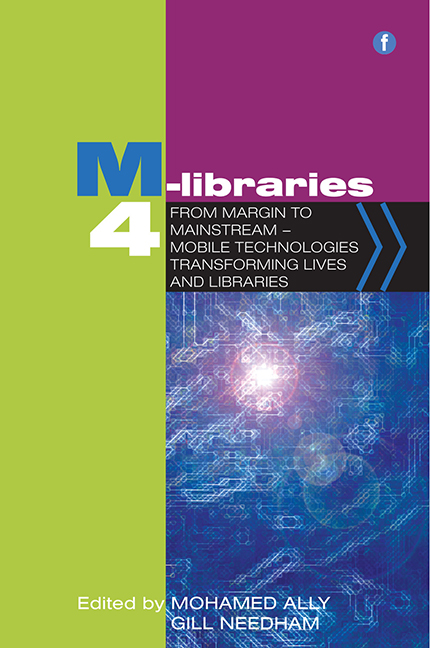Foreword
Published online by Cambridge University Press: 10 September 2022
Summary
It should not come as a surprise that library mobility is no longer a question: rather, it is firmly a reality. Fellow M-Libraries 2012 keynote speaker and UNESCO Programme Specialist in Mobile Learning Steve Vosloo noted that, as of 2012, there are close to 6 billion mobile subscriptions worldwide, 77% from developing nations alone.1 In January 2012, the Pew Internet and American Life project reported that approximately 20% of Americans owned a dedicated e-reader.2 Webenabled devices now facilitate ground-breaking literacy and learning projects and often provide the sole means of connectivity in low-resource areas. For all of these reasons and more, libraries and librarians worldwide must examine their orientation to the new mobile reality.
The lightning rise of mobile technology means that users’ expectations of mobile-optimized content and applications have become a foregone conclusion. Which is not to say that mobile tools, content, sites and apps should be taken up without prior critical consideration of user needs and available resources. As much as mobility can (and should) become a guiding force in library technology development, it is imperative that we also embrace complementarity, or the recognition that a range of formats, media and devices have equally important roles in the lives and preferences of users. Libraries have always celebrated a plurality of information sources and access methods, and the rise of mobile tools and e-reading represent yet another phase in our tirelessly shifting information context.
To truly innovate in mobile access and learning, libraries must not only embrace their role in the complementarity revolution, they must share what they learn from their model projects and their user experiences in order to push the field forward. If mobile access, research and reading are to become seamless in libraries, informed design and transparent communication about libraries’ collective efforts will be key. Sharing the impact and implications of mobile technology in libraries is the focus of the annual M-Libraries Conference and of the excellent collection of papers you will find herein.
Contributors to this volume showcase a diverse landscape of mobile development and deployment, from device-specific projects to content optimization and mobile learning programmes.
- Type
- Chapter
- Information
- M-Libraries 4From Margin to Mainstream - Mobile Technologies Transforming Lives and Libraries, pp. xix - xxPublisher: FacetPrint publication year: 2014

